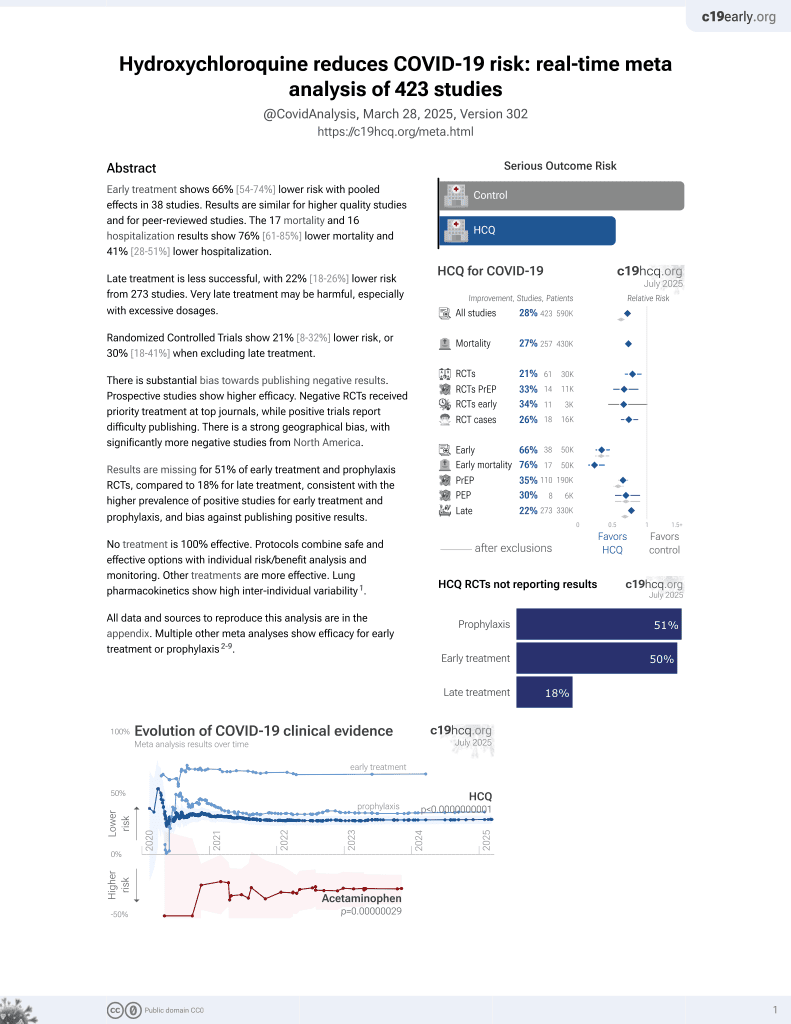Efficacy of Hydroxychloroquine as Prophylaxis for Covid-19
, M., arXiv.org, arXiv:2007.09477, Jul 2020
HCQ for COVID-19
1st treatment shown to reduce risk in
March 2020, now with p < 0.00000000001 from 423 studies, used in 59 countries.
No treatment is 100% effective. Protocols
combine treatments.
6,400+ studies for
210+ treatments. c19early.org
|
Secondary analysis of Boulware et al.'s PEP trial and treatment delay-response data, confirming that HCQ is effective when used early, p<0.01.
The effectiveness found is especially notable considering the limitations of the study. Treatment was relatively late, with enrollment up to
4 days after exposure, and an unspecified shipping delay. While the paper does not provide shipping details, the study protocol gives some detail allowing us to estimate the treatment delay as ~70 to 140 hours after exposure on average for the 1-4 days since enrollment specified in the paper (we will update this when authors respond to our request for details). There was only 75% medication adherence, including 16% who did not take the medication at all. The study relies on Internet surveys.
4 days after exposure, and an unspecified shipping delay. While the paper does not provide shipping details, the study protocol gives some detail allowing us to estimate the treatment delay as ~70 to 140 hours after exposure on average for the 1-4 days since enrollment specified in the paper (we will update this when authors respond to our request for details). There was only 75% medication adherence, including 16% who did not take the medication at all. The study relies on Internet surveys.
Some issues have been raised with this analysis. 1-tailed vs. 2-tailed tests - this is debatable, an argument can be made for both cases. However, it doesn't affect the conclusion in terms of the delay-response relationship showing statistically significant efficacy. Secondly, the paper projects the "1-4" day results to a day "0" result (in reality about 46 hours later in all cases), while the trend may well continue, we do not know this. However it doesn't change the outcome that the 1-4 day results show a statistically significant delay-response relationship.
10 meta-analyses show significant improvements with hydroxychloroquine for mortality1-4,
hospitalization1,
recovery5,
combined death/hospitalization/cases6,
cases7-9, and
viral clearance10.
Currently there are 8 HCQ for COVID-19 post-exposure prophylaxis studies, showing 46% lower mortality [-80‑84%], 16% lower hospitalization [-69‑58%], and 26% fewer cases [0‑45%].
1.
Landsteiner de Sampaio Amêndola et al., COVID-19 Infection in Rheumatic Patients on Chronic Antimalarial Drugs: A Systematic Review and Meta-Analysis, Journal of Clinical Medicine, doi:10.3390/jcm11226865.
2.
Risch, H., Early Outpatient Treatment of Symptomatic, High-Risk Covid-19 Patients that Should be Ramped-Up Immediately as Key to the Pandemic Crisis, American Journal of Epidemiology, kwaa093, 27 May 2020, doi:10.1093/aje/kwaa093.
3.
Risch (B), H., Response to: “Early Outpatient Treatment of Symptomatic, High-Risk Covid-19 Patients” and “Re: Early Outpatient Treatment of Symptomatic, High-Risk Covid-19 Patients that Should be Ramped-Up Immediately as Key to the Pandemic Crisis”, American Journal of Epidemiology, July 20, 2020, doi:10.1093/aje/kwaa152.
4.
Stricker et al., Hydroxychloroquine Pre-Exposure Prophylaxis for COVID-19 in Healthcare Workers from India: A Meta-Analysis, Journal of Infection and Public Health, doi:10.1016/j.jiph.2021.08.001.
5.
Prodromos et al., Hydroxychloroquine is effective, and consistently so used early, for Covid-19: A systematic review, New Microbes and New Infections, doi:10.1016/j.nmni.2020.100776.
6.
Ladapo et al., Randomized Controlled Trials of Early Ambulatory Hydroxychloroquine in the Prevention of COVID-19 Infection, Hospitalization, and Death: Meta-Analysis, medRxiv, doi:10.1101/2020.09.30.20204693.
7.
García-Albéniz et al., Systematic review and meta-analysis of randomized trials of hydroxychloroquine for the prevention of COVID-19, European Journal of Epidemiology, doi:10.1007/s10654-022-00891-4.
8.
Han et al., The efficacy and safety of hydroxychloroquine for COVID-19 prophylaxis and clinical assessment: an updated meta-analysis of randomized trials, Journal of Thoracic Disease, doi:10.21037/jtd-23-1043.
Watanabe et al., 18 Jul 2020, preprint, 1 author.
